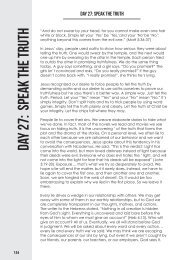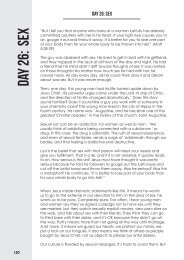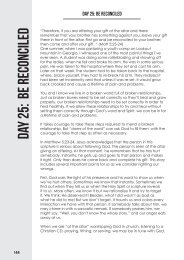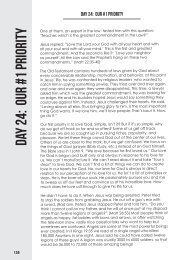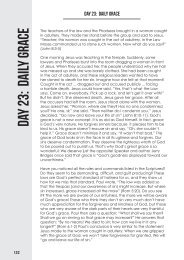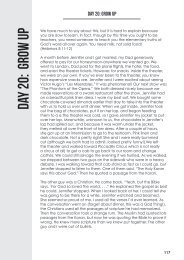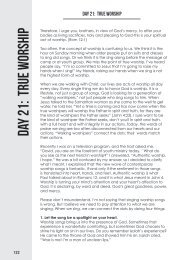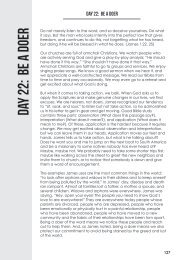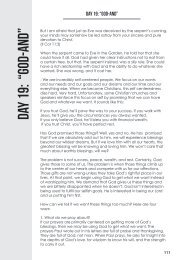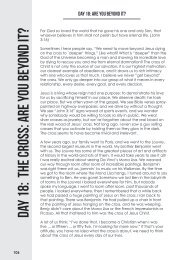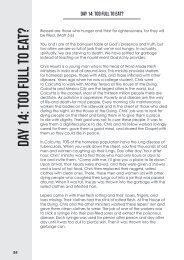Old Testament 2 Lesson 4
Old Testament 2 Lesson 4.pdf
Old Testament 2 Lesson 4.pdf
You also want an ePaper? Increase the reach of your titles
YUMPU automatically turns print PDFs into web optimized ePapers that Google loves.
Acknowledgments<br />
Living Logos was the heart-work of Bro<br />
Dale Starks and Sis Josephine Starks,<br />
missionaries to Singapore in the early<br />
1980s. As the original authors of this<br />
devotionals, the Starks meant for<br />
these self-study materials to help new converts<br />
(and matured saints alike) get a hold of an<br />
understanding of God’s written Word. Since Sis<br />
Stark’s passing in 2013, the couple had graciously<br />
entrusted Tabernacle of Joy with its copyright.<br />
Therefore, with every print run, we would like to<br />
honour their life work and sacrifice in bringing the<br />
gospel to Singapore. This copy is an updated and<br />
revised version. Be blessed as you immerse yourself<br />
in the Word and allow God to transform you into<br />
the likeness of Jesus Christ.<br />
1
<strong>Lesson</strong><br />
Four<br />
<strong>Old</strong> <strong>Testament</strong> 2<br />
<strong>Old</strong> <strong>Testament</strong> 2<br />
DAVID, THE SHEPHERD BOY<br />
One of the best-known stories from the Bible is the story of<br />
David, the shepherd boy, who killed the giant Goliath. This is<br />
that same David we will study about now.<br />
Samuel was still weeping for Saul, when God spoke to him one<br />
day,<br />
How long wilt thou mourn for Saul, seeing I have rejected him<br />
from reigning over Israel? Fill thine horn with oil, and go, I will<br />
send thee to Jesse the Bethlehemite: for I have provided me a king<br />
among his sons<br />
— I Samuel 16:1<br />
Samuel was reluctant to go, for he knew Saul would kill him<br />
if he found out what he had done. But the LORD told him to<br />
take a heifer with him, and say, “I am come to sacrifice to the<br />
LORD.” The LORD promised to identify to him the man who<br />
would be the next king. He was to call Jesse to the sacrifice<br />
with his sons, and God would do the rest (I Samuel 16:2-3).<br />
When Jesse came to the sacrifice with his sons, Samuel looked<br />
on Eliab and said, “Surely the LORD’s anointed is before<br />
him.” However, God said unto Samuel:<br />
...Look not on his countenance, or on the height of his stature;<br />
because I have refused him: for the LORD seeth not as man seeth;<br />
for man looketh on the outward appearance, but the LORD<br />
looketh on the heart<br />
— I Samuel 16:7<br />
Jesse made seven sons pass before Samuel, and each time<br />
Samuel would say, “The LORD hath not chosen this one.”<br />
When it appeared that Jesse had no more sons to pass before<br />
Samuel, Samuel asked him, “Are here all thy children?” Jesse<br />
replied, “There remaineth yet the youngest, and behold, he<br />
keepeth the sheep.”<br />
30
Jesse sent and had David brought from the field. David was ruddy (having<br />
a healthy red colour), beautiful, and goodly to look at. The LORD told<br />
Samuel, “Arise, anoint him: for this is he” (I Samuel 16:8-12).<br />
Then Samuel took the horn of oil, and anointed him in the midst of his<br />
brethren: and the spirit of the LORD came upon David from that day forward<br />
— I Samuel 16:13<br />
If you remember from previous studies, nobody had the Spirit of the LORD<br />
dwelling in them in the <strong>Old</strong> <strong>Testament</strong> era, but the Spirit of the LORD<br />
could come upon those whom God wanted to use in a special way.<br />
Meanwhile, the Spirit of the LORD departed from Saul, and an evil spirit<br />
troubled him. Saul’s servants suggested to Saul that a man who is a cunning<br />
player on a harp be sought out, and brought before the king to play whenever<br />
the evil spirit was upon him, and he would be well.<br />
Saul agreed to the suggestion, and one of the servants suggested David, for<br />
it was of the LORD:<br />
...Behold, I have seen a son of Jesse the Bethlehemite, that is cunning in playing,<br />
and a mighty valiant man, and a man of war, and prudent in matters, and a<br />
comely person, and the LORD is with him<br />
— I Samuel 16:18<br />
It seems that David had picked up his skill on the harp out in the fields,<br />
while watching his father’s sheep. David was sent for by Saul, who loved him<br />
greatly and made him his armour-bearer (I Samuel 18:21). An armour-bearer<br />
is a person who carries the armour or weapons for a warrior. This honour<br />
was given only to the most trusted people. This reveals how much Saul loved<br />
and trusted David at first, even with his own life.<br />
When the evil spirit would trouble Saul, David, the most versatile young<br />
man, would take his harp and play hymns of worship unto God (That was<br />
the only type of songs David wrote, at least that we know about). David<br />
wrote most of the psalms in the Bible. As David played, the evil spirit would<br />
depart from Saul, and he was refreshed (I Samuel 18:23).<br />
Sometime later, however, David returned home. The Bible does not<br />
give the reason for this. It could be because the Philistines had gathered<br />
themselves together against the Israelites, and now that Saul was soon to be<br />
engaged in real combat, he felt that his armour-bearer was too young and<br />
inexperienced.<br />
31
There is also the strong possibility that Jesse pleaded with Saul to allow<br />
David to return home to help him, because some of Jesse’s other sons had<br />
been drafted to fight against the Philistines (I Samuel 17:15).<br />
Saul and his armies pitched on one mountain, and the Philistines stood on<br />
a mountain on the other side, with a valley separating them.<br />
And there went out a champion out of the camp of the Philistines, named<br />
Goliath, of Gath, whose height was six cubits and a span<br />
— I Samuel 17:4<br />
Goliath was a huge man, nine feet and nine inches tall. He was also heavily<br />
covered with armour, from the top of his head to the bottom of his feet. The<br />
metal coat he wore for protection weighed about 166 pounds. Besides that,<br />
a man bearing a shield ran before him to give him further protection<br />
(I Samuel 17:5-7).<br />
Goliath came down the mountain side and approached Israel close enough<br />
to challenge them:<br />
...why are ye come out to set your battle in array? am not I a Philistine, and ye<br />
servants to Saul? choose you a man for you, and let him come down to me.<br />
If he be able to fight with me, and to kill me, then will we be your servants: but if<br />
I prevail against him, and kill him, than shall ye be our servants, and serve us.<br />
...I defy the armies of Israel this day; give me a man, that we may fight together<br />
— I Samuel 17:8-10<br />
When Saul and all Israel heard his words, they were troubled and greatly<br />
afraid. Meanwhile, David had been sent by his father to the battlefield to<br />
see how his brothers were doing. The Philistine drew near the Israelites<br />
morning and evening for forty days, but no one accepted his challenge.<br />
David arrived just before the giant made his boast, and greeted his brethren.<br />
When David heard the giant give his challenge, he expected men to willingly<br />
respond - perhaps even one of his own brothers. But all the men of Israel<br />
were terrified by Goliath! (I Samuel 17:11-24)<br />
Some of the men told David that the king had offered a reward to the man<br />
that killed Goliath. The reward was the privilege of marrying the king’s<br />
daughter, great riches, and his father’s house would be free in Israel. David’s<br />
brothers were angry with him for his interest in the battle. Eliab, his oldest<br />
brother, said, “I know thy pride, and the naughtiness of thine heart; for<br />
32
thou art come down that thou mightest see the battle” David answered,<br />
“What have I now done? Is there not a cause?” (I Samuel 17:25-29).<br />
David made it known that he would fight against Goliath. When these<br />
words were repeated to the king, he sent for David. David told Saul, “Let<br />
no man’s heart fail because of him; thy servant will go and fight with this<br />
Philistine” (I Samuel 17:32).<br />
But Saul replied, “Thou art not able to go against this Philistine to fight<br />
with him: for thou art but a youth, and he a man of war from his youth.”<br />
Then, David told Saul about two occasions when he was keeping his father’s<br />
sheep. On one occasion, a lion came and took a lamb out of the flock.<br />
David went after him and killed him. The other time it was a bear that<br />
David killed (I Samuel 17:32-35).<br />
Thy servant slew both the lion and the bear: and this uncircumcised Philistine<br />
shall be as one of them, seeing he hath defied the armies of the living God.<br />
...The LORD that delivered me out of the paw of the lion, and out of the paw<br />
of the bear, he will deliver me out of the hand of this Philistine...<br />
— I Samuel 17:36-37<br />
Saul could only answer, “Go, and the LORD be with thee.” How amazed he<br />
must have been at the talent and character of David - and now his courage!<br />
Saul armed David with his armour, and he put a helmet of brass upon<br />
David’s head, and armed him with a metal coat. Then David strapped his<br />
sword to the armour and tried to walk - but he could not! All the equipment<br />
weighted him down.<br />
He quickly put them all off! He had never used them before and he would<br />
not use them now. He took his staff in his hand, and chose five smooth<br />
stones out of the brook. In the other hand was his sling (I Samuel 17:38-40).<br />
When David wasn’t playing songs on his harp, while watching his father’s<br />
sheep, he was probably practicing with his sling. He had probably killed the<br />
lion and the bear in that manner. Now, his practice would come in handy,<br />
although the giant was heavily armoured. In fact, there was only a small<br />
spot on the upper part of the forehead that was not covered by the helmet.<br />
It would take the help of God to hit that spot, but David believed that his<br />
God would help him!<br />
David drew near Goliath, and the Philistine began to draw nearer to David,<br />
with the man that carried the shield going before him. When the Philistine<br />
33
saw David, he began to laugh and mock him, saying, “Am I a dog, that thou<br />
comest to me with staves?” Then, he cursed David by his gods, and said,<br />
“Come to me, and I will give thy flesh unto the fowls of the air, and to the<br />
beasts of the field” (I Samuel 17:41-44).<br />
Then said David to the Philistine, Thou comest to me with a sword, and with a<br />
spear, and with a shield; but I come to thee in the name of the LORD of hosts,<br />
the God of the armies of Israel, whom thou hast defied.<br />
This day will the LORD deliver thee into mine hand; and I will smite thee,<br />
and take thine head from thee; and I will give the carcases of the host of the<br />
Philistines this day unto the fowls of the air, and to the wild beasts of the earth;<br />
that all the earth may know that there is a God in Israel.<br />
And all this assembly shall know that the LORD saveth not with sword and<br />
spear: for the battle is the LORD’s, and he will give you into our hands<br />
— I Samuel 17:45-47<br />
David was so anxious to kill Goliath that he literally ran towards him.<br />
When he got close enough, he put his hand in his bag and pulled out a<br />
stone. After fitting it in his sling, he whirled it around a few times - and<br />
then let it go. The stone struck the giant on the forehead, and he slumped<br />
to the ground.<br />
Then, David raced to the giant’s side, took his sword, and cut off his head.<br />
When the Philistines saw their champion dead, they began to flee. The men<br />
of Israel took new courage, now that Goliath was out of the way, and pursued<br />
after the Philistines. Thus, the Israelites won a great victory that day,<br />
thanks to a young shepherd boy who trusted in his God (I Samuel 17:48-52).<br />
When David returned from the slaughter of the Philistines, Saul said to<br />
him, “Whose son art thou, young man?” This is a very strange question, as<br />
David had formerly served as Saul’s armour-bearer, and had played the harp<br />
for him. Saul had known then who David’s father was. We can only guess<br />
that as the evil spirit continued to trouble Saul, he was gradually losing his<br />
mind. Saul took David that day, and would not let him return to his father’s<br />
house.<br />
DAVID AND JONATHAN’S FRIENDSHIP<br />
...the soul of Jonathan was knit with the soul of David, and Jonathan loved him<br />
as his own soul<br />
— I Samuel 18:1<br />
34
This is the most beautiful example of friendship in the Bible, except for the<br />
close relationship that existed between Jesus and his disciples. This was not<br />
impure and unholy love manifested between two homosexuals. David and<br />
Jonathan were friends, not lovers. Their love for one another is an example<br />
of what Peter was talking about in I Peter 1:22:<br />
Seeing ye have purified your souls in obeying the truth through the Spirit unto<br />
unfeigned (genuine) love of the brethren, see that ye love one another with a<br />
pure heart fervently<br />
— I Peter 1:22<br />
Jonathan and David made a covenant with each other, because of their<br />
love. This evidently was an agreement that they would always remain close<br />
friends, and would be loyal to one another, despite whatever happened<br />
(I Samuel 18:3).<br />
Jonathan stripped himself of his robe, his garments, even to his sword and<br />
bow, and gave it to David. Meanwhile, Saul had made David chief of his<br />
army, and David was accepted in the sight of all the people, as well as Saul’s<br />
servants. Yet there was one thing that bothered Saul! Whenever David had<br />
returned from the slaughter of the Philistines, the women had come out of<br />
all the cities of Israel, singing and dancing, to meet King Saul. They played<br />
their tambourines and instruments of music with great joy while they sang a<br />
song that did not make Saul very happy:<br />
And the women answered one another as they played, and said, Saul hath slain<br />
his thousands, and David his ten thousands<br />
— I Samuel 18:7<br />
Saul liked the first part of the song, but not the last part. “They have<br />
ascribed unto David ten thousands, and to me they have ascribed but<br />
thousands; and what can he have more but the kingdom?” Saul took careful<br />
notice of David from that day on. Perhaps that is why he insisted that David<br />
leave his home and live with him (I Samuel 18:8-9).<br />
More and more, Saul became like a mad man. The day after David moved<br />
in to live with Saul and Jonathan, the evil spirit began to trouble Saul, so<br />
David played on his harp like he used to do. This time, it did no good! Saul<br />
had a javelin in his hand at the time, and he cast it at David, attempting<br />
to smite him even to the wall with it. Twice David had to escape out of his<br />
presence (I Samuel 18:10-11).<br />
And Saul was afraid of David, because the LORD was with him, and was<br />
departed from Saul<br />
— I Samuel 18:12<br />
35
Saul had David removed from his presence by making him captain over<br />
a thousand soldiers. David behaved himself wisely in all of his ways, and<br />
the LORD was with him. Because David was now out among the people,<br />
they came to love him even more, but Saul looked for a way to have David<br />
destroyed.<br />
He told David, “If you will fight the LORD’s battles for me, I will give my<br />
daughter Merab to be your wife.” Saul was counting on David being killed<br />
in battle action, but this did not happen. Meanwhile, he had given Merab to<br />
another man.<br />
When he found out that another daughter, Michal, loved David, he devised<br />
another plan that he felt surely would lead to David’s death. He had his<br />
servants commune with David secretly about how the king would delight to<br />
have him for a son-in-law. David seemed greatly honoured by the prospect,<br />
and the servants told this to Saul. Then, Saul told the servants to tell David<br />
he could marry Michal, but he must pay dowry. The king did not want any<br />
money. He wanted the foreskins of one hundred Philistines! The king felt<br />
sure that this time David would be killed.<br />
David and his men arose and slew two hundred Philistines, and brought<br />
their foreskins to the king as proof of their deaths. The king had no<br />
alternative. He gave Michal to David to be his wife. Meanwhile, his fear of<br />
David continued to grow. He knew that all Israel and Judah loved him. He<br />
was probably also aware of David and Jonathan’s friendship<br />
(I Samuel 18:13-28).<br />
And Saul was yet the more afraid of David; and Saul become David’s enemy<br />
continually<br />
— I Samuel 18:29<br />
VOCABULARY<br />
carcases —<br />
dead bodies<br />
cunning —<br />
javelin —<br />
versatile —<br />
skillful or clever<br />
a light spear<br />
competent in many things<br />
36
<strong>Old</strong><br />
<strong>Lesson</strong><br />
<strong>Testament</strong><br />
Four<br />
2<br />
Test<br />
1<br />
2<br />
3<br />
4<br />
5<br />
6<br />
7<br />
8<br />
9<br />
10<br />
11<br />
Was it the will of God for Samuel to keep weeping for Saul?<br />
__________________________________________________.<br />
What did God tell Samuel, when he believed Eliab must be the one God<br />
would choose to be king?<br />
__________________________________________________________<br />
_________________________________________________________.<br />
What kind of a spirit began to trouble Saul?<br />
__________________________________________________.<br />
What suggestion was given to relieve Saul of the oppressing spirit?<br />
__________________________________________________________<br />
_________________________________________________________.<br />
Did Saul love David at first? __________________________________.<br />
In addition to playing the harp for Saul, what other position did David<br />
occupy?<br />
_________________________________________________________.<br />
What was Goliath, the Philistine, called (from I Samuel 17:4)?<br />
_________________________________________________________.<br />
What was his size? __________________________________________.<br />
Describe his armour.<br />
__________________________________________________________<br />
_________________________________________________________.<br />
When David first volunteered to fight against Goliath, what was the<br />
king’s answer?<br />
__________________________________________________________<br />
_________________________________________________________.<br />
What did David tell the king to encourage him to allow him to go?<br />
__________________________________________________________<br />
_________________________________________________________.<br />
37
12<br />
13<br />
14<br />
15<br />
16<br />
17<br />
18<br />
19<br />
20<br />
What did the Philistine say when he saw David coming?<br />
__________________________________________________________<br />
_________________________________________________________.<br />
David told the Philistine, “I come to thee _________________________<br />
__________________________________________________________<br />
________________________________________________________.”<br />
David also told him, “… for the battle is __________________________<br />
________________________________________________________.”<br />
Did the stone kill the giant? ___________________________________.<br />
Based on the Scriptures, to what extent did Jonathan love David?<br />
__________________________________________________________<br />
_________________________________________________________.<br />
What song did Saul not like?<br />
__________________________________________________________<br />
_________________________________________________________.<br />
Why was Saul afraid of David?<br />
__________________________________________________________<br />
_________________________________________________________.<br />
How did he try to kill him?<br />
__________________________________________________________<br />
_________________________________________________________.<br />
What was of special interest to you in this lesson?<br />
38
205 Henderson Road, #07-01<br />
Henderson Industrial Park, S159549<br />
Tel: 63344022 Email: contactus@tabjoy.org<br />
Website: www.tabjoy.org







